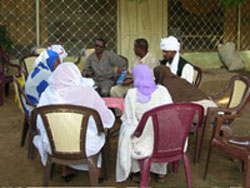Professional Training Program Officers Jacki Wilson and Nina Sughrue conducted a highly successful skills training workshop in Kassala, Sudan, on September 12-14, 2005. The University of Kassala hosted the workshop, which was held in partnership with the Sudan Inter-Religious Council.
Professional Training Program Officers Jacki Wilson and Nina Sughrue conducted a highly successful skills training workshop in Kassala, Sudan, on September 12-14, 2005. The University of Kassala hosted the workshop, which was held in partnership with the Sudan Inter-Religious Council. Kassala was chosen for the workshop to provide skills to empower influential leaders to help facilitate the peaceful resolution of existing tensions and help prevent the escalation of future conflicts in eastern Sudan.
The feedback on the program in Kassala was overwhelmingly positive. The newly appointed Wali of Kassala State met with the program officers and workshop sponsors and indicated that this might in fact have been the first international workshop held in Kassala. Likewise, the chancellors of the University of Kassala and the University of Gedaraf were both vocal about their support for Institute initiatives. The Minister of Social Affairs spoke at the final ceremony and all were supportive of a stronger working relationship with the Institute, and expressed great appreciation for bringing the workshop to eastern Sudan.
The primary objective of the workshop was to provide and develop skills that would prove useful to the participants for the peaceful resolution of conflicts: negotiation, communication, and working with a third party. Participants also examined their personal tendencies of reacting to conflict situations as well as situations where other styles might prove useful. The group held a collegial culture circle that set the stage for lively and insightful role-plays and participation in a problem solving exercise. In addition, several guest speakers gave presentations on conflict resolution in Islam, traditional conflict resolution mechanisms of eastern Sudan, and the use of drama in conflict resolution. These presentations helped participants realize that the spectrum of techniques and tools available for the peaceful resolution of conflicts is very broad and can range from interest-based negotiation to traditional methods.
The 35 workshop participants represented a variety of political parties, with most being politically active in the Beja Congress or the ruling National Congress Party. The Democratic Unionist Party, Umma Party and the Justice Party were also represented. The SPLM provided representatives from their women's and youth programs. Several participants were eastern Sudanese who live and work in Khartoum, and several had started local NGOs in addition to their being politically active. Most participants were under 35, and clearly represented the future leaders of eastern Sudan. The participants actively participated in the workshop activities and were eager to apply their new skills to their own situations.



